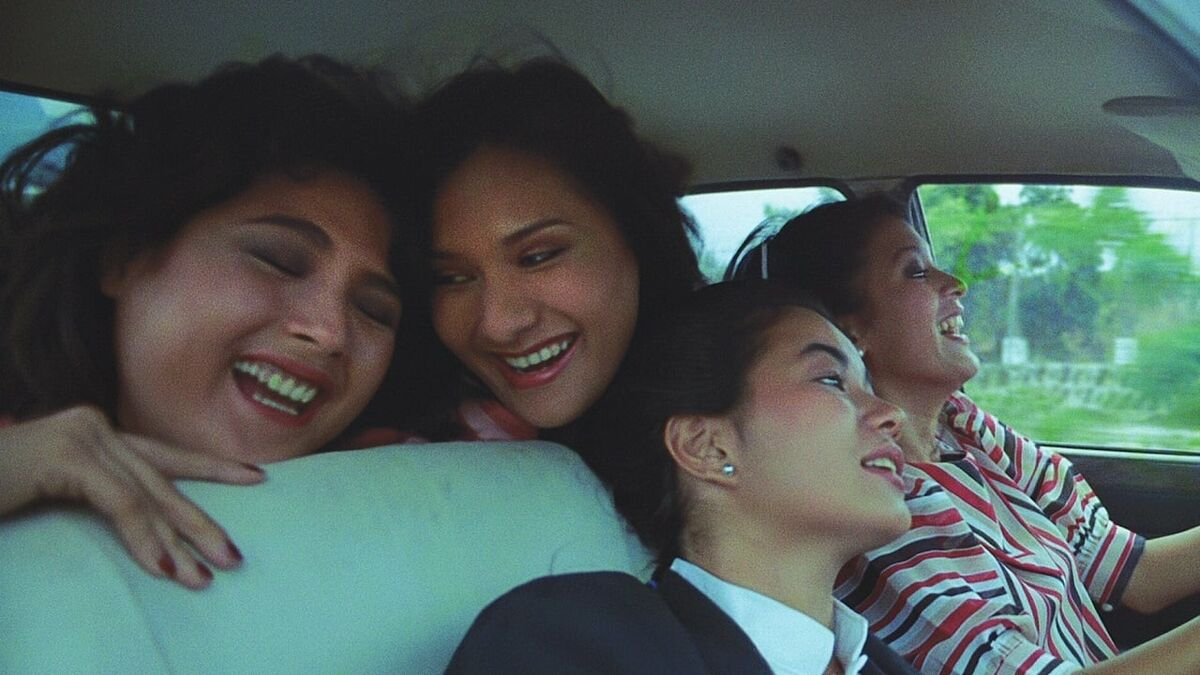Marilou Diaz-Abaya’s Moral (1982) is widely regarded as a feminist and humanist masterpiece in the Philippines. A sprawling coming-of-age tale, Diaz-Abaya’s fifth feature charts the intersecting lives of four colegialas—drug addict Joey (Lorna Tolentino), newlywed Maritess (Anna Marin), school teacher Sylvia (Sandy Andolong), and aspiring singer Kathy (Gina Alajar)—as they grow up during the dictatorship of Ferdinand Marcos Sr. Penned by frequent collaborator Ricky Lee, Moral is the second of a loose trilogy of feminist films by the director-screenwriter duo. The film came about the year after martial law in the Philippines was formally terminated. Though Marcos was not ousted until 1986, Moral was born from and into a nation on the precipice of attaining freedom. It inadvertently doubles as a snapshot for the shift in morals and gender roles that happened during this crucial time.
With Moral, Diaz-Abaya and Lee abandon the genre fare of their previous collaboration, Brutal (1980), as well as the traditional three-act structure expected of narrative filmmaking. Instead, they opt for a character-driven drama that focuses on the contradictions women encounter within the home, school, music industry, and armed revolution in the Philippines. Diaz-Abaya exposes the different contexts that keep women trapped by older norms in society—where sexual liberation is held back by conservatism; marriage is ruled by male desires and impulses; the illusion of meritocracy in music hides sexual exploitation; and human rights and women’s bodies remain battlegrounds.
What makes Moral radical is how Diaz-Abaya and Lee insist that female friendship and solidarity outlast patriarchal practices and stigmas, a feature present from the film’s opening. Soon after Maritess and her fiancée walk down the aisle, a drug-addled Joey wordlessly stumbles in tow, looking for her seat. At the front of the ceremony, Sylvia reads a passage from one of St.Paul’s letters to the Ephesians that details how wives should submit to their husbands. Kathy then sings a heartfelt, off-key solo during the Eucharist. As the couple make their vows, people in the crowd exchange odd glances and judgments about the young girls. They also gossip about the shotgun wedding. Though one expects the scene to culminate in a kiss, Moral skips this and instead shows the four women, arms interlocked, walking out of the church and into the world smiling.
Diaz-Abaya shows how all four friends help each other reinvent themselves beyond the archetypes of womanhood that have been assigned to them by society, and in this rebirth, they find ways of resisting the patriarchy. Maritess stands up to her husband after experiencing marital rape and breaks out of her life as an unhappy babymaker; Sylvia quits her prim and proper life as a schoolteacher and enters an affair with a fellow schoolteacher and, later, a polyamorous relationship with her ex-husband and his new male lover; Kathy abandons her ambitions of becoming a popstar and focuses instead on developing her middling talents in singing; and Joey transforms from a lost cause trapped in a cycle of debauchery into an independent woman after housing a female activist.
Diaz-Abaya interrogates why Filipinas are “predisposed to being martyrs” and asks what their role is in the personal and social injustices that plague them; in turn, rejecting the larger notions of guilt and shame that expect women to submit to repressive ideologies. Moral reminds us that the rise of authoritarianism reflects a crisis of solidarity. To experience true emancipation and a new morality, one must be willing to bind their liberation up with another’s.
Moral screens this evening, February 12, at Asia Society as part of the series “Films to See Before You Die.”



